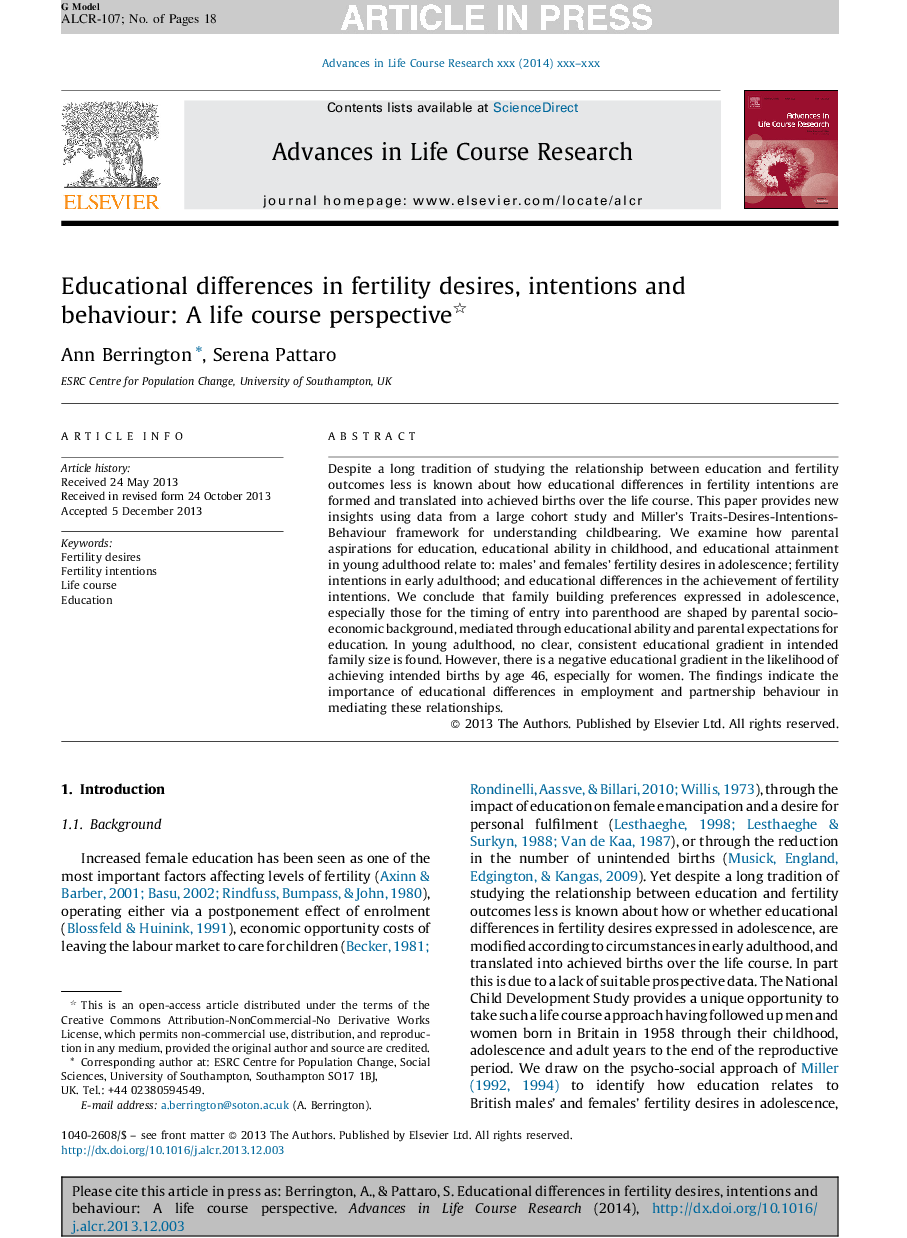| کد مقاله | کد نشریه | سال انتشار | مقاله انگلیسی | نسخه تمام متن |
|---|---|---|---|---|
| 6785034 | 534330 | 2014 | 18 صفحه PDF | دانلود رایگان |
عنوان انگلیسی مقاله ISI
Educational differences in fertility desires, intentions and behaviour: A life course perspective
ترجمه فارسی عنوان
تفاوت های آموزشی در خواسته ها، نیت ها و رفتارهای باروری: دیدگاه دوره زندگی
دانلود مقاله + سفارش ترجمه
دانلود مقاله ISI انگلیسی
رایگان برای ایرانیان
کلمات کلیدی
میل به باروری، نیات باروری، دوره زندگی، تحصیلات،
ترجمه چکیده
علیرغم سنت طولانی مطالعه رابطه بین تحصیلات و نتایج باروری، کمتر در مورد اینکه چگونه تفاوت های آموزشی در قصد های باروری شکل می گیرد و به تولد های به دست آمده در طول زندگی طول می کشد، شناخته شده است. این مقاله بینش های جدیدی را با استفاده از داده های مطالعه ی همبستگی بزرگ و چارچوب صفات-میل ها-اهداف میلر برای درک والدین ارائه می دهد. ما بررسی می کنیم که چگونه آرمان های والدین برای آموزش و پرورش، توانایی های آموزشی در دوران کودکی و میزان تحصیلات در بزرگسالان جوان مربوط به: خواسته های باروری مردان و زنان در نوجوانی؛ نیات باروری در اوایل بزرگسالی؛ و تفاوت های آموزشی در دستیابی به اهداف باروری. ما نتیجه می گیریم که ترجیحات ساختاری خانواده، بیان شده در دوران نوجوانی، به ویژه برای زمان ورود به پدر و مادر، به واسطه زمینه های اجتماعی و اقتصادی والدین، به وسیله توانایی های آموزشی و انتظارات والدین برای تحصیل، میانجی است. در بزرگسالان جوان، هیچ شفاف و سازگار آموزشی در اندازه خانواده در نظر گرفته نشده است. با این حال، شانس منفی آموزشی در احتمال دستیابی به تولد مورد نظر در سن 46 سالگی، به ویژه برای زنان وجود دارد. یافته ها نشان می دهد اهمیت تفاوت های آموزشی در رفتار اشتغال و مشارکت در میانجی سازی این روابط.
موضوعات مرتبط
مهندسی و علوم پایه
ریاضیات
آمار و احتمال
چکیده انگلیسی
Despite a long tradition of studying the relationship between education and fertility outcomes less is known about how educational differences in fertility intentions are formed and translated into achieved births over the life course. This paper provides new insights using data from a large cohort study and Miller's Traits-Desires-Intentions-Behaviour framework for understanding childbearing. We examine how parental aspirations for education, educational ability in childhood, and educational attainment in young adulthood relate to: males' and females' fertility desires in adolescence; fertility intentions in early adulthood; and educational differences in the achievement of fertility intentions. We conclude that family building preferences expressed in adolescence, especially those for the timing of entry into parenthood are shaped by parental socio-economic background, mediated through educational ability and parental expectations for education. In young adulthood, no clear, consistent educational gradient in intended family size is found. However, there is a negative educational gradient in the likelihood of achieving intended births by age 46, especially for women. The findings indicate the importance of educational differences in employment and partnership behaviour in mediating these relationships.
ناشر
Database: Elsevier - ScienceDirect (ساینس دایرکت)
Journal: Advances in Life Course Research - Volume 21, September 2014, Pages 10-27
Journal: Advances in Life Course Research - Volume 21, September 2014, Pages 10-27
نویسندگان
Ann Berrington, Serena Pattaro,
